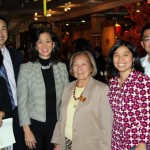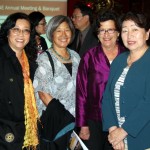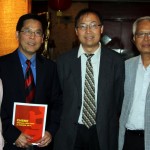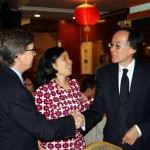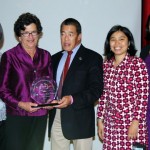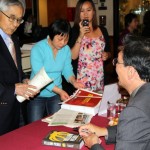By Sherry Dong, president of Chinese History Society of New England (CHSNE), on Sept. 24, 2014
Halfway through the week, we hope we can help you ease into the weekend with the Chinese Historical Society of New England’s annual banquet. Thank you Susan Chinsen for introducing tonight’s program.
Last year we were pleased to welcome Susan as our managing director. As you’ll see in more depth in our Chronicle, in this past year, Susan and CHSNE have been very busy programming, offering a range of lectures, field trips, tours, films, theatre and other activities to reach out to the broader community and fulfill our mission. We hope you were able to join us for some of those offerings and plan to participate in more this coming program year.
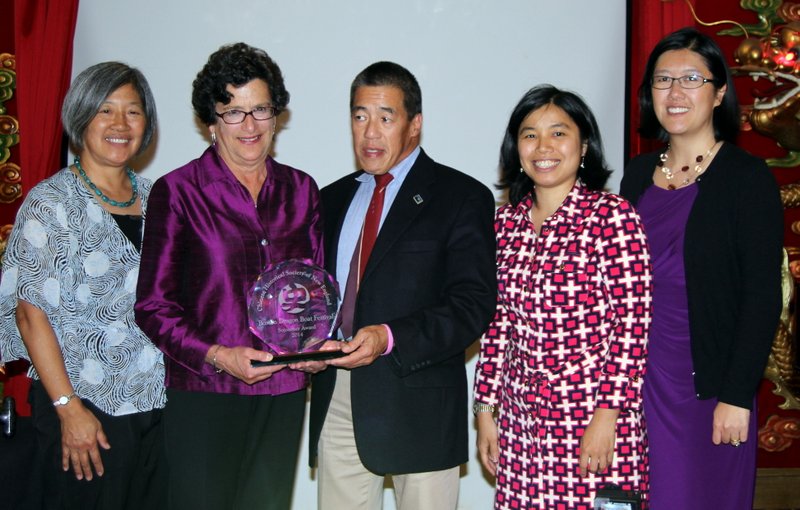
(R to L)Susan Chinsen and Sherry Dong present Sojourner Award to Peter Lew, Leslie Swartz and Nancy Sato who founded Boston Dragon Boat Festival 35 years ago (photos by David Li).
A few highlights include co-sponsoring and hosting a reception for local filmmaker Ursula Liang and her documentary 9-Man, about a unique way of playing volleyball in the Chinese community, which features many in the local community, including former CHSNE board member and friend Reggie Wong. We branched into our other New England states with field trips to exhibits in Connecticut and New Hampshire, the first highlighting a recent influx and growing Chinese community, the second an art exhibit by an international artist with roots to Boston via her son, artist Wen-ti Tsen.
My personal highlight was the opportunity to represent CHSNE on a MA delegation to Guangzhou China to commemorate the 230th anniversary of the first contact between the US and China and discuss trade and economic development opportunities. This first contact involved MA, PA and NYC from the US, with MA building the vessel, Empress of China, NYC with the major investors and port of departure, Philadelphia where the captain hailed from, and Guangzhou serving as port of entry for the US merchants.
CHSNE and I are honored to be joined by Colin Lin, who is visiting from China, whose brainchild this commemoration was, as well as other members from the MA delegation, including Richard Elam, head of the MA Office of International Trade and Investment, who led the MA delegation.
As many of you may know, perhaps because of your own family’s immigration history, the first significant wave of Chinese immigration and settlement in the US came from the Pearl river delta villages in Guangdong province. Most early Chinese spoke Toisanese or similar dialects, followed by Cantonese and more recently Mandarin and other dialects. So for me it was like visiting home, as my family is from Toisan.
Please indulge me in this personal highlight from my visit. It seems so appropriate for CHSNE. I am still incredulous, so feel the need to share it with others.
I first met a number of my mother’s extended family in HK 8 years ago, when we went back to my parents ancestral villages, so I added a few days in HK to visit them. They took me to pay respects to my maternal grandfather who passed away in Hong Kong when my mother was a child. I met 4 generations of family members, including my mother’s uncle, cousins and their kids and kids kids. All of this was amazing enough. But most amazing was a chance encounter, or maybe it was fate, and family reunification aided by my visit.
My relatives live in Kowloon, and rarely if ever venture to Hong Kong island. On the last day of my visit I wanted to visit a few sites on Hong Kong island. When we were done my uncle took me to the harbor to see Hong Kong’s golden flower symbol and the view of Kowloon. Soon after we got there he started talking to someone. After a while he excitedly called me over to take a picture of them. I obliged. He then told me the most incredible thing – that this was his oldest brother who was given away as a child because the family was too impoverished to care for the whole household. He’d met him decades ago when their mother searched for him before she passed. But as records and tracking of people’s comings and goings in China were more challenged in those days they lost touch. After attempts to relocate him failed the family assumed he must have passed away.
This oldest brother just happened to be on a tour from China visiting Hong Kong and my uncle just happened to take me to the same exact site at the same time! In a country of billions and an island of millions, I am still amazed and humbled to be a part of that family history. It was perfect too that he discovered my uncle, as my uncle was stressing to me how important it is to keep in touch with family, to meet them, connect the generations, share stories, and to not lose our family history and Chinese culture.
I am grateful to CHSNE and the Commonwealth for making this reunification possible, and my family is especially grateful! If I didn’t believe it fate before I certainly do now.
A few other highlights, for this coming year, we have already confirmed the return of author Ruthann Lum McCunn for Nov 6, to discuss her new book, “Chinese Yankee”, about a Chinese American civil war soldier. [Ruthann read from her book “God of Luck”, about the Chinese labor experience in Peru, 6 years ago and welcome her return to Boston.] We are also co-sponsoring 9-Man’s return to Boston at the Boston Asian American Film Festival on Sat, Oct 25.
If anyone would like to volunteer to help organize, CHSNE is very interested in hosting a field trip to NYC for the exhibit “Chinese American: Exclusion/Inclusion”, about the long history of trade and immigration between the US and China, which will explore the question, “What does it mean to be an American”, which opens this weekend at the New York Historical Society. Our guest speaker Professor Jack Tchen is very involved with the exhibit, and coincidentally one of the curators for this exhibit is the daughter of one of Tufts Medical Center’s highly regarded physicians, John Wong. And through that connection she reached out to me to inquire about photos for the exhibit.
We are proud to share that 2 photos from CHSNE’s collection, including one recently donated by Mr. Frank Chin and depicting a group of Chinese men from Boston, including Mr. Chin, boarding a plane to participate in a volleyball tournament, are part of the exhibit. Amy Guen also loaned a family artifact to the exhibit, belonging to her mother-in-law. So we encourage you to visit the exhibit, and to share your photos and artifacts with CHSNE, who knows where they may appear to tell a story about the Chinese American experience.
So thank you all, our volunteers, interns, members, board members, friends and corporate and philanthropic donors for supporting us tonight and throughout the year, we hope you enjoy the program, the food and the good company and stories.
Sojourner Awardee:
Last but not least on tonight’s agenda is presenting our Sojourner award, honoring individuals and organizations who help us in our mission of preserving and promoting Chinese American history and culture, or for their contributions in making and becoming an important part of our community’s history. We are honored that a # of past recipients are with us tonight, including Frank Chin, Tunney Lee, South Cove Manor Nursing Home, Jill Cheng, Billy Chin, Shanghai Printing and likely others I am missing. Thank you all for your contributions!
How many in this room have paddled before in the Boston, or any dragon boat race, or attended the Boston dragon boat festival? I for one have a sister who was obsessed with dragon boating, having done it for 15 years, and co-captained and coached her team from NYC. She would chide me for calling it rowing, its paddling not rowing! How many people have made that mistake?
The Boston Dragon Boat Festival celebrates its 35th anniversary this year. It had a spectacular turn out at this year’s races, making history with over 60 boats and 1000 paddlers representing local nonprofits and corporations as well as national and international teams. In attendance enjoying the cultural performances, activities, and arts and crafts were 1000s, tens of 1000s people from the Asian and broader communities.
We wanted to share this brief video about Boston’s Dragon Boat Festival before continuing. (SHOW VIDEO)
Without the vision and fortitude of a few right here in Boston, as you heard in the video, we might not have this annual race and cultural festival in the Boston area. Boston’s is the oldest such festival in North America. If you’ve gone to one recently, you’ve seen how much takes place and what great opportunities there are to learn and keep up with Asian heritages, sample foods, and cheer paddlers on.
Not only has the Boston Dragon Boat Festival committee and its founders kept the traditions alive, even in turbulent weather conditions and with fits and starts as Leslie mentioned, they have also played an important role helping other cities and towns nationally, and locally, start their own festivals, including most recently Malden, which held its first dragon boat races.
Please help me to welcome Leslie Swartz, Nancy Sato and Peter Lew, to accept CHSNE’s Sojourner Award on behalf of the Boston Dragon Boat Festival.
